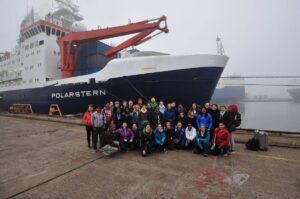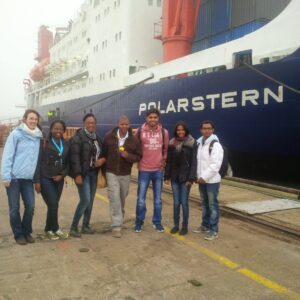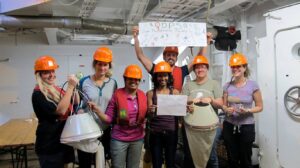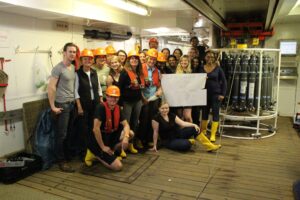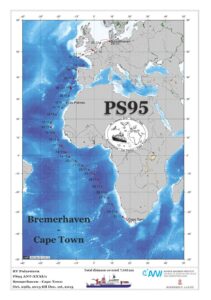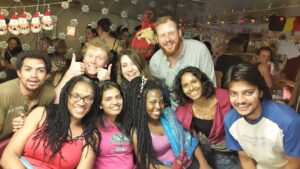POGO Alumnus:
NF-POGO-AWI Shipboard Training (NoSoAT), 2015
“My journey with POGO and NANO dates back to 2015 when I was the first Mauritian candidate to be selected for the first North to South Atlantic transect from Germany to South Africa on board the Polarstern Research Vessel. It was an incredible and life-changing experience for me. We were 32 candidates from all corners of the globe, chosen out of ~ 500 applicants. Being the first candidate from Mauritius Island to be selected for the first NoSoAT was very humbling and it brought me immense pride and satisfaction to be able to introduce my small paradise island, Mauritius, to all the other fellow participants and to the personnel on board the research vessel.”
I have graduated with a PhD degree in Oceanography in 2019 and since the beginning of the year 2020, I am on a two-year postdoctoral research contract at the University of Washington in Seattle.
My journey with POGO and NANO dates back to 2015 when I was the first Mauritian candidate to be selected for the first North to South Atlantic transect from Germany to South Africa on board the Polarstern Research Vessel. It was an incredible and life-changing experience for me. We were 32 candidates from all corners of the globe, chosen out of ~ 500 applicants (Fig. 1 and 2). Being the first candidate from Mauritius Island to be selected for the first NoSoAT (Fig. 3) was very humbling and it brought me immense pride and satisfaction to be able to introduce my small paradise island, Mauritius, to all the other fellow participants and to the personnel on board the research vessel.
When I first boarded the Polarstern, I was very impressed. The Polarstern research vessel is like a small village in itself with dry labs, wet labs, conference rooms, helicopter pad, meteorological station, kitchen, dining halls, small shop, gym, swimming pool and even a sauna, which I have to admit I did not have the chance to experience since we were having long and busy working days.
Speaking about the work on the Polarstern, we spent five weeks at sea and the 32 candidates were split into five smaller groups (Fig. 4) with each group working on one particular topic per week. We were trained in oceanographic data collection and analyses such as CTD data collection and water filtration with Pauhla McGrane and Karen Wiltshire (Fig. 5). We worked on phytoplankton taxonomic identification with Alexandra Kraberg, zooplankton collection and identification with Maarten Boersma and remote sensing with Birgit Heim and Therese Keck. All along, Claudia Hanfland and Karine Lochte gave us various lectures on how to improve our soft skills in project and time management, how to develop our scientific and ethical skills and how to publish peer-reviewed articles.
These five weeks on board the Polarstern have had life-lasting impacts for me. This experience equipped me with important scientific and technical skills which prepared me for my PhD research work which I started shortly after. Since I’ve already spent five weeks at sea on such an impressive research vessel like the Polarstern, it was no longer daunting to me to go on 2-week research cruises in the Indian Ocean for my PhD research project. I was already equipped with the knowledge and expertise to collect and analyse scientific and oceanographic data.
Furthermore, I cannot be thankful enough to AWI and NF-POGO to have chosen me and made my path cross all the other 32 incredible participants of the first NoSoAT. These participants have now become an important part of my scientific network and some of them have become dear friends. We are still in touch with each other, following each other’s work, encouraging and supporting each other in our endeavours.
I also have to admit that my time on the Polarstern has not been all work and no play. I was so surprised by the life-long tradition of baptising the newbies who are crossing the equator for the first time. It was my first baptism and what an experience to be baptised in the middle of the Atlantic on the Polarstern. It was not your traditional baptism but rather one where you are plunged in a pool of cold water and loads of other weird and smelly stuffs are dumped all other you. I also remember that a few times in the evenings, the scientists would organise themed parties on board the research vessel (Fig. 6). I remember when we arrived in Cape Town, Karin Lochte said the NoSoAt was some kind of social experiment whereby they have put so many people of various background, culture, religion, nationalities on one vessel for five weeks and how she said that we, the participants of the NoSoAT could teach the whole world a thing or two about how to accept and appreciate each other’s diversity and differences. Despite our differences, this experience turned incredibly well and we all got along exceptionally well since we all shared one common passion, the Ocean.
I would highly recommend students worldwide to apply for this internship. It will be a life-changing experience I can guarantee. I really wish I could go back on the Polarstern myself to relive these bittersweet memories and experiences again.
List of Figures:
Fig. 1 Students selected for the 2015 NOSOAT Floating Summer School. The picture also shows the scientists Pauhla McGrane, Therese Keck, Birgit Heim, and Alexandra Kraberg.
Fig. 2 African candidates selected to take part in the 2015 first NOSOAT Floating Summer School. From left to right: Amy Rossenrode (formerly Amy Wright), Edem Mahu, Ngozi Oguguah, Ngwako Mohale, Mohammed Kajee, Pavanee Angelee Annasawmy (me), and Zo Rasoloarijao.
Fig. 3 NoSoAT transect
Fig. 4 Some members of one of the five student groups including scientist, Alexandra Kraberg. From left to right: Hanna Scheuffele, Elvita Eglite, La Daana Kanhai, Pavanee Angelee Annasawmy (me), Philipp Wenta (back), Alexandra Kraberg and Monica Demetriou.
Fig. 5 Few students, cruise organisers and lecturers standing next to a CTD which was deployed at the Equator in the Atlantic Ocean
Fig. 6 African-themed party. From left to right, top row: Zo Rasoloarijao, Dominik Auch, Lowri Evans, Hugo Maxwell; Bottom row: Ngozi Oguguah, La Daana Kanhai, Edem Mahu, Pavanee Angelee Annasawmy (me) and Muhammad Abdullah. Delicious African dishes were prepared by Ngozi Oguguah.
